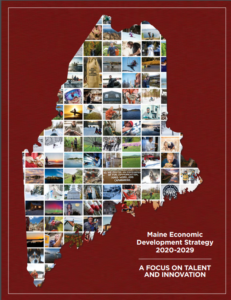Maine’s 10 Year Economic Plan
Dear Governor Mills, Members of the Legislature and residents of Maine,
This is a 10-year Economic Development Strategy for Maine. It is a dynamic and nonpartisan roadmap designed to foster collaboration among the public, private, nonprofit and education sectors for the purpose of creating a diverse and sustainable economy. It is the culmination of non-partisan contributions of over 1,300 Maine people; the level of public engagement in this process was overwhelming, and we hope to have captured the ideas and energy within.
Maine is at an economic crossroads. We face serious challenges: a likely global downturn as part of the normal economic cycle; an aging workforce; and threats to some of our largest industries due to technology and climate change. This plan isn’t naive about those challenges, but attempts to build on the opportunities that change presents. Maine has the wind, tides, sunlight, and expertise to lead in developing solutions to the global climate crisis. With innovations that are already underway, we can diversify our heritage industries. We can grow protein in new ways to diversify fishing and farming. We can use wood and wood residuals for new fuels, plastics, and building materials. We can advance health with our biosciences and technologies. The possibilities are limitless. Our growth potential lies at the intersection of global trends and Maine’s assets.
Maine also has thriving tourism, hospitality and outdoor recreation sectors that are critical to our economy. People who experience Maine come back for more — many as tourists, and some as residents. Showcasing Maine’s beauty is part of our growth strategy.
I learned again through this process the special character of Maine people. The other day an entrepreneur said to me, “People want to help; anyone in Maine will at least have a cup of coffee with you and give you their ideas.” This is an example of the connectedness that is part of our Maine fabric, an ability to work together toward a common goal, a knowledge that the success of one aids the success
of all. This is the commitment and the energy that we will carry forward into implementation.
I’d like to thank the thousands who participated in our hearings and online surveys: the 50 members of our subcommittees; the dozens of staff; the six members of the working team; and particularly Bruce Wagner of the Finance Authority of Maine, who organized and led this planning process. We all share a common value: there is a place in Maine’s economy for everyone, and we need everyone to participate to succeed.
Thank you,
Heather Johnson
Commissioner of the Maine Department of Economic and Community Development


